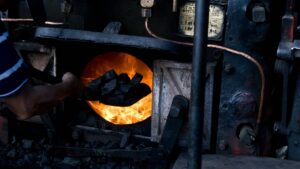Adani ready to float first controversial coal cargo from its Carmichael mine

Pic: Getty
Adani – or rather its Australian subsidiary Bravus Mining & Resources – has assembled the first shipment of coal from the Carmichael mine at the North Queensland Export Terminal (NQXT) in Bowen.
Changing names was a smooth move by the company after a lengthy ‘Stop Adani’ campaign by climate activists since it bought the project in 2010.
Some activists ain’t giving up just yet – with one person chaining themselves to a train carrying coal from the mine earlier this month during testing and commissioning of the company’s new trains.
But Adani Bravus is going full steam ahead with the coal now to be loaded and dispatched as per NQXT’s normal operations and subject to the port’s shipping schedule.
Costing the state $3.4 million a day in lost royalties
Last week the Queensland Resources Council (QRC) head honcho Ian Macfarlane said the legal consequences for activists who stop trains from hauling coal to port needs to take into account that the unlawful behaviour currently costs the state taxpayer about $3.4 million a day in lost royalty taxes.
“Right now, Queensland needs all the revenue it can get to deal with the ongoing, economic impact of Covid-19, which is unfortunately a long way from being over,” he said.
“People who choose to lock themselves onto rail lines and port equipment and climb onto coal wagons are not harmless, and their actions come at a huge cost to individual companies and to Queensland.”
“It’s an impossible situation on sites like Bravus’ Carmichael Mine where protesters are encamped without consent and creating unnecessary physical risk and mental stress for law-abiding workers.”
He’s kind of got a point for people just doing their jobs – but then again so does this guy.
While we are at it, how about tougher penalties (in fact just any penalties) for using the atmosphere as a sewer?
— Tim Stephens (@ProfTimStephens) December 19, 2021
Won’t somebody please think of the jobs
Bravus Mining & Resources CEO David Boshoff said that from day one the objectives of the project were to supply “high-quality Queensland coal to nations determined to lift millions of their citizens out of energy poverty, and to create local jobs and economic prosperity in Queensland communities in the process”.
“With the support of the people of regional Queensland we have delivered on that promise,” he said.
Boshoff also said the Carmichael Project had provided more than 2,600 direct jobs and paid more than $1 billion to regional Queensland contractors and businesses since construction began.
But the Australian Conservation Foundation sure isn’t convinced, with climate campaign manager Gavan McFadzean pointing to recent analysis by Accenture, which showed Australia could have 395,000 new jobs and generate $89 billion in new trade by 2040 through investment in clean exports.
“Australia can replace and grow the revenue and jobs we currently get from coal and gas exports with clean exports,” he said.
“Burning coal is warming our planet to dangerous levels. New coal mines that make that problem worse are not cause for celebration.”
‘A mockery of our commitment to phase down coal’
McFadzean said the shipment makes a mockery of Australia’s commitment to ‘phase down’ coal at the COP26 summit last month.
“The world has agreed to phase down coal, yet here in Australia, Adani and our governments are trying to phase it up,” he said.
“The federal and Queensland governments have gone to great lengths to help Adani, but even so there are big question marks over the long term viability of this project.
“No bank is prepared to fund the Carmichael mine, instead Adani’s parent company is coughing up the finance.
“With the world turning its back on coal, the future of this mine remains uncertain,” he said.
In May the Federal Court put a halt to Adani’s plan to take 12.5 billion litres of water from Queensland’s Suttor River to service the mine.
“Without that water, it’s hard to see how Adani has enough resources to operate a coal mine,” McFadzean said.
But an energy mix looks like the way forward
Interestingly, Boshoff did say that Aussie coal will have a role to play, alongside renewables, for decades to come as part of an energy mix that delivers reliable and affordable power with reduced emissions intensity.
“That’s why Carmichael makes sense, and why, as a group, Adani is also heavily investing in renewables,” he said.
In May, the company announced it had acquired SB Energy Holdings Ltd, which will see Adani Green Energy achieve a total renewable energy capacity of 24.3GW.
The company said this makes them the world’s largest solar company and proves they are ‘walking the talk’ when it comes to delivering a sustainable energy mix.
And they’re not alone.
Last week the International Energy Agency, which has previously said no new oil and gas developments and coal mines or extensions should be developed in its net zero by 2050 pathway, said2022 could be the peak for coal production around the world.
That is due to demand growth in China (less than 1% per year between 2022 and 2024) and India (4% a year to 2024), where two-thirds of the world’s coal is consumed.
India’s hunger for coal will add 130Mt to global coal demand by 2024, projected to be around an 8.025Bt a year market between 2022 and 2024, the highest level ever.
“For most industrial purposes where coal is used, such as iron and steel production, there are not many technologies that can replace it in the short term,” the IEA said.
The IEA said the increase in consumption set the world further away from its net zero by 2050 pathway in 2021, a path it won’t reconnect with until after 2024.
“Furthermore, we do not expect (unabated) coal consumption and production to be on the Net Zero by 2050 pathway by 2024,” they said.
Statement: Environment Minister Sussan Ley should reject a proposal for a huge open cut metallurgical and thermal coal mine in central Queensland because it would worsen climate change and hasten the destruction of the Great Barrier Reef https://t.co/7uJqjvlTRV
— Australian Conservation Foundation (@AusConservation) December 23, 2021
‘A sad day for the Great Barrier Reef’
However, Stop Adani is adamant that coal in any way, shape or form is only going to further damage the Great Barrier Reef.
“This is a sad day for the Great Barrier Reef – a sad day for Australia and one we have dreaded,” University of Queensland coral reef scientist Dr Selina Ward said.
“We have had three huge bleaching events on the GBR in the past six years.
“More frequent marine heat waves are inevitable as we increase emissions and reefs will not have time to recover between these events, so mortality will continue.
“The best way to increase loss of the GBR is to continue to keep digging up and burning coal.
“Australia has 60,000 jobs and $6 billion a year from the Great Barrier Reef.
“Is persisting with new coal mines worth this?”
Related Topics
UNLOCK INSIGHTS
Discover the untold stories of emerging ASX stocks.
Daily news and expert analysis, it's free to subscribe.
By proceeding, you confirm you understand that we handle personal information in accordance with our Privacy Policy.








